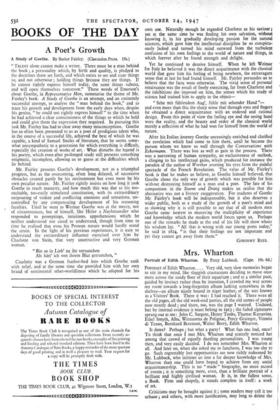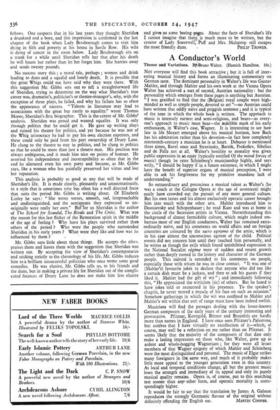Mrs. Wharton
Portrait of Edith Wharton. By Percy Lubbock. (Cape. 10s. 6d.)
PORTRAIT of Edith Wharton.... Very old, very slow memories began to stir in my mind, like sluggish crustaceans deciding to move once more across the sandy floor of their aquarium ; and at a similar pace, guided by instinct rather than by intention, I crawled my way across my room towards a long-forgotten album lurking somewhere in the shelves—an album nicely bound in niger leather, of the sort known as a Visitors' Book. There it was : I had reached it. There were all the old pages, all the old week-end parties, all the old names of people now mostly dead ; and there, too, was the page I wanted. Undated, but by internal evidence it must belong to 1913 ; the faded signatures sprang out at me : John C. Sargent, Henry Tonks, Thamar Karsavina, Ethel Smyth, Alba, Winnaretta de Polignac, Percy Grainger, Vittoria di Teano, Bernhard Berenson, Walter Berry, Edith Wharton.
It dates? Perhaps ; but what a party! What fun one had, once! To think that once I met Mrs. Wharton and scarcely noticed her among that crowd of equally dazzling personalities. I was young then, and very easily dazzled. I do not remember Mrs. Wharton at all. And later on, when she asked me to luncheon, I was too shy to go. Such regrettably lost opportunities are now richly redeemed by Mr. Lubbock, who initiates us into a far deeper knowledge of Mrs. Wharton than one could have hoped to achieve from any social acquaintanceship. This is no " made " biography, no mere record of events ; it is something more, even, than a brilliant portrait of a brilliant and highly civilised woman. It is, in the fullest sense, a Book. Firm and shapely, it stands complete in itself : a work of art.
Criticisms may be brought against it ; some readers may call it too urbane ; and others, with more justification, may long to delete the fellows. One suspects that in his last years they thought Sheridan a drunkard and a bore, and this impression is confirmed in the last chapter of the book when Lady Bessborough comes to visit him dying in filth and poverty at his house in Savile Row. His wife is dying of cancer in the room below. Lady Bessborough sits on a trunk for a while until Sheridan tells her that after his death he will haunt her rather than let her forget him. She hurries away and sendS twenty pounds.
No success story this ; a moral tale, perhaps ; women and drink leading to duns and a squalid and lonely death. It is possible that the great Whigs could not have said why they were there. With this suggestion Mr. Gibbs sets out to tell a straightforward life of Sheridan, trying to determine on the way what Sheridan's true career was, dramatist's, politician's or theatre-manager's, why, with the exception of three plays, he failed, and why his failure has so often the appearance of success. " Talents in literature may lead to associations with the great but rarely to equality," wrote Thomas Moore, Sheridan's first biographer. This is the centre of Mr. Gibbs' analysis. Sheridan was proud and wanted equality. It was only through politics that he could get it. He gave up writing plays and ruined his theatre for politics, and yet because he was not of the Whig aristocracy he had to pay his own election expenses, and these could only be paid from his part ownership of Drury Lane. He clung to the theatre to stay in politics, and he clung to politics so that he could be more than just a theatre man. His position was always ambiguous, and it made him nice on points of honour. He asserted his independence and incorruptibility so often that in the end he alienated even his own party and became, as MT. Gibbs says, like a woman who has painfully preserved her virtue and lost her reputation.
This analysis is probably as good as any that will be made of Sheridan's life. It is made clearly, pleasantly and unostentatiously, in a style that is sometimes trite but often has a well directed force that suits the period Mr. Gibbs is writing about. Of Elizabeth Linley he says : " She wrote verses, smooth, sad, irreproachable and undistinguished, and the sentiaments they expressed so un- originally were really her own." BurFor us Sheridan is the author of The School for Scandal, The Rivals and The Critic. What was the reason for this last flicker of the Restoration spirit in the middle of the age of feeling ? Why have his plays survived rather than others of the period ? Who were the people who surrodndect Sheridan in his early years ? What were they like and how was he influenced by them ?
Mr. Gibbs says little about these things. He accepts the plays. praises them and leaves them with the suggestion that Sheridan was written out. By accepting the view of Sheridan's contemporaries and sticking strictly to the chronology of his life, Mr. Gibbs reduces him to a brilliant unsuccessful politician who once wrote some good comedies. He was elusive, Mr. Gibbs tells us, to his friends and the duns, but in making a private life for Sheridan out of the compli- cated finances of Drury Lane he does not make him less elusive
and gives us some boring-laws. About the facts of Sheridan's life I cannot imagine that thert.itffmuch more to be written, but the creator of Lady Sneerwell, and Mrs. Malaprop still escapes

































 Previous page
Previous page